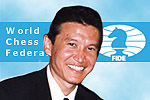A captain is entitled to advise the players of his team to make
or accept an offer of a draw or to resign a game, unless the regulations of the
event stipulate otherwise. He must confine himself to give only brief
information, based solely on the circumstances pertaining to the match.
He may say to a player, "offer a draw", "accept the draw", or
"resign the game". For example, if asked by a player whether he should accept an
offer of a draw, the captain should answer "yes", "no", or delegate the decision
to the player himself.
The captain should abstain from any intervention during play.
He should not give any information to a player concerning the position on the
chess board, nor consult any other person as to the state of the game. Players
are subject to the same prohibitions.
Even though in a team competition there is a certain team
loyalty, which goes beyond a player's individual game, a game of chess is
basically a contest between two players. Therefore, the player must have the
final say over the conduct of his own game. Although the advice of the captain
should weigh heavily with the player, the player is not absolutely compelled to
accept that advice. Likewise, the captain cannot act on behalf of a player and
his game without the knowledge and consent of the player.
All discussions shall take place in sight of the arbiter and he
shall be entitled to insist on hearing the conversation.
A team captain should influence his team always to follow both
the letter and the spirit of Article 12 of the FIDE Laws of Chess concerning the
conduct of the players. Team championships should be conducted particularly in
the spirit of the highest sportsmanship.


